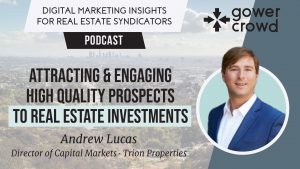FREE TRAINING
What is Real Estate Crowdfunding?
Learn how to build wealth and earn passive income in real estate while someone else does all the work.
022 Agents Sell for More Quicker When It's Their Own Home

Prof. Chad Syverson, Chicago Booth...

First Offer Earns Agent 98% of Commission
The origins of this research came out of personal experience renovating homes and then putting them on the market and wondering what were the dynamics at play when an agent lists a home for sale: What are the agents’ incentives, what kinds of services do they offer, how do they get paid. This led to the question of misalignment of interests between the sales agent and the homeowner. The agent only gets a small percentage of the sales price ‘on the margin’ i.e. the last few thousand dollars of sale price earn the agent a minimal additional fee, and so do they really work for their clients to get the best price possible.
Leaders of The Crowd
Conversations with Crowdfunding Visionaries and How Real Estate Stole the Show
Discover how laws that gave us crowdfunding were solely meant to finance small companies and yet inadvertently opened the doors to allow you to invest in real estate like never before.
Read the book and listen to the actual conversations.

The theory is that the dynamic really changes when there is an offer on the table. At that point the agent has earned 98% of the commission they are going to earn. If they recommend to a seller to hold out and wait for another two, three weeks for a better offer, and consequently have to incur time and money expenses showing the home, advertising etc., the amount of incremental commission is not worth it to the agent – even if the additional sales price is worth it to the seller.
How to Fund Your Deals
7 Steps to Raising Equity Online
Research Objective
Recognizing that agents also sell their own houses, the study set out to test this theory by looking at how agents perform when they sell their own houses versus how they do when they sell on behalf of clients. This data is readily available because agents are required to report when they are selling their own home as a mandated disclosure. The insight this perspective brings is akin to seeing what physicians a doctor takes her own family to, or what does a car mechanic do when they work on their own car.
In short, the study gives an opportunity to see what the expert does when they serve themselves, versus when they are hired to do it for a client.
No Motivation to Work for a Better Offer
The way that agents are currently compensated creates a misalignment between the agent’s incentives and the home seller’s incentives. When a home is sold, there is a commission that is paid to the agent of 5-6% that is split with half of that going to the seller’s agent and half going to the buyer’s agent, and then the agent has to split again with their brokerage which differs from company to company, and from agent to agent, and in all cases reduces the share of the commission to the individual agent. If we assume that the broker split is 50%, then the share that the listing agent gets somewhere between 1.25% and 1.5% of the total sale price.
Now you may think that this is what you want; that as the sale price goes up for the home, the agent is compensated more because they get a percentage of the sale price as their commission. So you might think that the motivations of the agent and of the seller are aligned, but it is the magnitude of the incentives on the margins that creates the misalignment.
Example
Let’s say you get an offer of $637,000 for a home. At that point the agent has earned around $17,500 in commission. To get an additional 4% for the sale of the home would add over $25,000 to the sale price that would go straight into the seller’s pocket, but would earn the agent only an additional $350. That $350 is only 2% more commission for the agent and in nominal dollars. This is just not worth the extra effort working for two or three weeks more, doing more showings and open houses, and continuing to advertise the property. The agent would rather recommend to the seller that they accept the offer, take their commission, and move on to the next deal – but the seller would clearly be better off with the extra $25,000. The problem is, therefore, that the commission rate returns on the margin such a small amount to the agent that gives them such a low incentive to proceed relative go the home seller.
The researchers looked at this typical case and compared it to what happens when an agent sells his or her own house. In this case it is the agent that is getting the lower offer and has the option whether or not to take it or to wait for the higher offer.
Findings: When agents sell their own house they keep the house on the market for about 10% longer and they end up selling it for almost 4% more than an otherwise identical house when representing a client.
Information Gap
These findings are amplified where the information available to the seller is less. For example, in an area where all houses are very similar, say in a tract home where the neighbors’ houses are almost identical, sellers see what nearby homes are sold for and are better informed about the value of their own home so they are going to be less inclined to accept a lower price. However, where homes are very different in an area, it is harder for a home owner to predict the value of their house and so they are more dependent on the agent’s advice and likely more inclined to take an early offer that may be lower than they otherwise could get. This is exactly what the study found; that where homes are less similar, agents sold their own homes for proportionally more than when they sold their own homes in areas where homes were very similar.
Double Sided Agency - Barrier to Disruption
So what is going on where you have this uniformity of commission structures nationwide that has persevered despite the pressures of a competitive economy? There seems to be something ‘special’ about needing two agents in the transaction; one on the buy side and one on the sell side. This two-agent structure makes the model ‘stickier’ than has been seen in other industries, such as the travel agent industry, or the stockbroker industry where there is only one agent involved.
In the travel industry, once technology allowed for efficient disintermediation of the agent and it became possible to book a flight or a hotel directly, there was nothing to stop consumers from going straight to the airline or hotel. Similarly, with the stock broker; as soon as the consumer could buy stocks directly using their computer or telephone bypassing the agent, the agent role became redundant.
This is harder when there are two agents involved, one on each of the buy and the sell sides of the transaction. In this case while you may have a model that evolves that disintermediates the sales side of the equation, or sharply reduces the cost in some way to the home seller, you still have a buy side agent to contend with. This buy side agent may be reacting to the new model and resisting the changes that they are seeing to their industry by steering their clients away from homes that are put on the market in a way that is unfavorable to their own interests i.e. the reduced commission or full disintermediation model where sellers don’t need a listing agent at all.
Steering
Evidence of this is found in other research conducted by the same authors that compared the sales prices of agents who use a flat-fee model with those of agents who use the full commission model. The flat fee agents were able to sell for as much as the full commission agent but it took longer to achieve this result. This indicates steering by buyer agents away from the listings of flat fee agents. That said, this result also shows that although the sales price was not higher, the net return to the home seller was higher because they did not have to pay the full commission of the selling agent – they just paid the lower flat fee.
While steering clients away from a home because an agent does not like the listing agent’s business model is unethical, possibly illegal, its illicit implementation does serve to enforce the existing full commission model on the industry in general and may help explain why the real estate industry has these commission rates nationwide that vary very little.
Your Agent is Not Free
One factor holding up the disruption of the industry is this notion that buyers have that the agent representing them is free: They are not. While the seller does, technically, pay both buy and sell side agents, the seller is using buyer money to pay them. Buyers assign excessive authority to their agent because contractually it is the seller who is paying the buyer agent and so, technically, not a cost to the buyer. However, this is not how the transaction works economically and it is indeed the buyer who must find a larger down payment, and a larger loan to consummate the transaction in order to provide enough funds to pay the buyer agent also.
Tipping Point
Syverson and Levitt found that the magnitude of the sales price difference between the commissioned agent selling their own property and the commissioned agent selling a client’s property became smaller over time. It was more pronounced during the early periods of the study’s data set, the early 1990’s, and less so in the later period, the early 2000’s. This indicates an erosion of the commissioned agent’s exclusive ownership of market data and an increasing sophistication on the part home selling public. As the availability of home sales data has become ever greater, the information gap between the agent and the home seller has reduced, and the consumer is now more alert to the value of their own home and less likely to take an offer simply because an agent insists it is likely their best option. Whether this phenomenon has reached the point at which the fee based agents’ rise in the market is imminent remains to be seen.
RELATED PODCASTS
322 John Oechsle, President & CEO Swiftpage
Last Updated on September 15, 2021 by Dr. Adam Gower WHITE BOARD WORKSHOP Need More Money to Finance Your Real Estate Projects? Learn how to find more investors, raise more…
READ MORE >379 Andrew Lucas, Director of Capital Markets at Trion Properties
Last Updated on September 15, 2021 by Dr. Adam Gower Andrew Lucas, Trion Properties How to Attract and Engage High Quality Prospects to Real Estate Investments The Investor Acquisition System:…
READ MORE >












